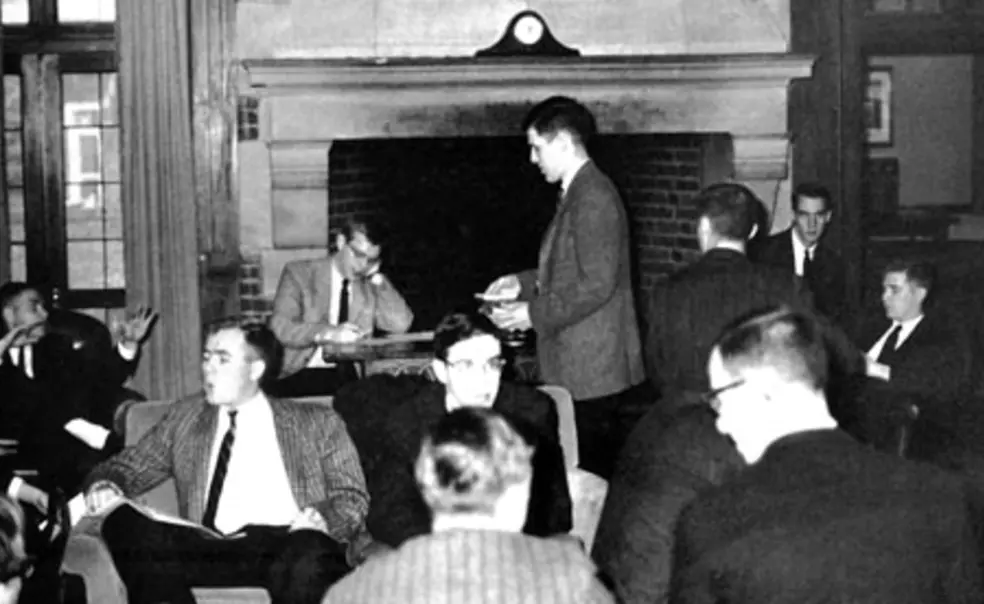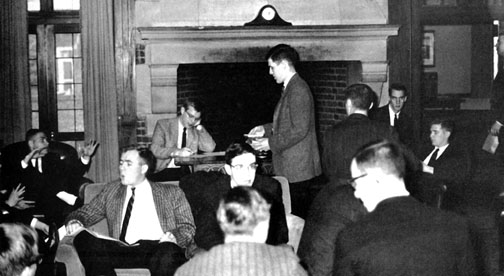The Class of ’62 and the Princeton they knew
Last spring, PAW invited members of the Class of 1962 to talk about their undergraduate experiences in a series of interviews recorded at Reunions. The following excerpts highlight a few common topics — including eating clubs, women on campus, and academics — from those conversations. Recordings and transcripts will be archived in the University Archives. Video excerpts are available at PAW Online.
FIRST IMPRESSIONS
The Class of ’62 was among the first in which public-school grads outnumbered those from prep schools, and according to some classmates, the difference between the two groups was apparent during freshman year.
Al Muller: I came from a public high school, a darn good one, but I was way out of my league when I got here. I mean, I just breezed through high school — and then here, I thought I was going to flunk out.
Barry Bosak: I came from Exeter. ... We had 36 members of our class come [to Princeton]. Yale had 50 from my class of 220, and Harvard 71. But that’s the way things were back then.
Muller: Prep-school preparation, I think, was a lot better than the high schools — even the best ones. I hadn’t really known how to study until I came here.
John Bales III: One of the first grades I got here at Princeton was on a paper that I worked very hard on. ... It was about a 10-page paper, and I thumbed through all the pages, and there were no marks. And I thought, well, this is good, reminds me of high school. ... We had a grading system that went from 1 to 7, a little different from now. Seven is a total disaster. He had written “6.” And the only thing on the paper was the word “nonsense.” And I thought, oh my God, I am in a totally different environment here.
David Entin: Freshman Shakespeare was by far the hardest class I’d ever had. We were reading two plays a week, plus 100 pages of criticism, plus writing papers — it was just overwhelming. And yet, I wrote my first paper, and the professor called me in and said, “You know, you write well, you have good ideas, we should hear more from you.” ... It was amazing, because these kids from prep school had read these plays before; I had maybe read one Shakespeare play in my life. It was all new to me. ... They were spouting off in class, and I was sort of in awe. Then I found out it was the art of bull.
THE SOCIAL SCENE
Eating clubs held a prominent place in ’62’s social life, but alternatives were starting to emerge. The class arrived not long after the contentious bicker of 1958, in which 23 sophomores were left without bids and many alleged discrimination against Jewish students.
Bales: The club system was the only avenue for social life. If you weren’t in a club, it was a strain to find a social environment. We didn’t have the [residential] college system. My friends who were not in clubs had to go up to Nassau Street to find some place to spend time with their dates. And the pressure to get into clubs — the whole process, I think — was not the kind of environment for social life at a university.
Entin: I remember in our class we did have 100 percent bicker. And then when I was on Inter-Club Council, I pushed strongly for having 100 percent. Everybody that wanted to get in ... would get in a club.
Mac Odell: I was actually a rebel at the time. I was one of the ones that stood up and raised my voice in protest over bicker and helped found the Woodrow Wilson Society, Woodrow Wilson Lodge, where I spent the last couple years of my Princeton time. I thought there should be an alternative.
Bruce Dunning: There was a sense of adventure [at Wilson Lodge]. We were doing something new. ... The Wilson group, it wasn’t just outcasts, but they were more independent-thinking people: some campus lefties and also a lot of evangelicals, because they didn’t like the club scene. But we had quite an interesting group. We did unusual things, like inviting professors to meals. That had never been done. The clubs started doing that later.
IN THE CLASSROOM
Fifty years after graduation, several classmates still had vivid memories of their favorite professors.
Doug Davis: Oskar Morgenstern was fabulous. He was the professor of business cycles, and I’ve been a business-cycle theorist all my life because of him.
Robert Burkhardt: For me, the most significant was Sherman Hawkins. He was this young guy, and he had these big, huge glasses, owl-eye glasses. And I remember going into a class, I think it was Poetry 206, and he started off by reading some poems. I had never heard poetry read before. Yes, I had listened to some people attempting to read poetry. This guy, the emotion in Wordsworth, and Keats, and Shelley, that he had — I, we, just everyone in the course leaned forward in their chairs. ... He would make the English language come alive.
Jim Hunter: All of the chemical engineers took organic chemistry, and [John] Turkevich [*34] was the guy. And he was just a dynamo. He was incredible. ... I mean, they were fun to go to, those classes, even if they were at 8 o’clock in the morning.
Andy Hall: I took a logic course with John Tukey, who was a renowned logician at the time. ... He was a very bright teacher, but he had a way of presenting the material in a way that just sort of made it very easy to understand and get your head around. And he was fabulous in that way.
Odell: I took a course from Eric Rogers, a physics course that totally fascinated me. ... And I suddenly thought of myself as being the next great physicist. ... I dropped out of architecture, went into physics, and totally bombed out in advanced math. ... Rogers was an absolutely mind-blowing genius, and a wonderful, wonderful guy. Got me going in the wrong direction, but that’s OK. I forgave him immediately.
CHANGES ON THE HORIZON
For the Class of ’62, women were occasional visitors, not classmates. Princeton had few minority students, and the campus seemed isolated from America’s growing attention to race relations and civil rights.
Bob Medina: You know, on the weekend, you imported women, and they stayed at the local boarding house. It was a different world. ... It was actually safer, if you brought a girl into your room past 9 o’clock, to have her spend the night than to have her leave at 9:15.
Dunning: Princeton was a very little, upper-class, upper-middle-class group of white guys. There was no real diversity. ... But I thought it was quite diverse — I was meeting people from all over the country who had different experiences.
Odell: We had our token Jewish population. We had our even-more-token black population. ... We had a very modest international student body.
Bales: We were living in a little cocoon. It never dawned on us that there was a whole upheaval beginning in the country. ... it’s just too bad that I didn’t have a broader awareness and put on some shoes and get on a bus and go down to southern Alabama, and go down to places where young people of my age were making a difference down there. And not only was I not making a difference, I didn’t even have a sense of what was going on.
Interviews by Brett Tomlinson and Allison S. Weiss ’13. Transcriptions by Erin McDonough ’14.













2 Responses
George Chang ’63
4 Months AgoRemembering the Shakespeare Seminar
Somehow I always thought that David Entin was in the Class of 1963. He must have taken Alan Downer’s freshman Shakespeare class the year before I did.
As I think back on The Taming of the Shrew, I think that our instructors didn’t really emphasize a couple of important things:
a) The play may have been based on Queen Elizabeth (the first) and her lovers. It could have been very dangerous to write about her, but a play based in old Italy might have been safer.
b) The basic story could be that Kate was amused by the fool Petruchio, for whatever irrational reasons. And that she kept him as a sort of amusement. Some years ago the BBC came out with a version of Taming of the Shrew in which Kate was a member of Parliament. I think that the BBC version had the right idea.
Don Cantrell ’53
10 Years AgoProfessors at Prospect Club
In the excellent article on “The Class of ’62 and the Princeton they knew” (Alumni Scene, Nov. 14), there is a misstatement of fact that deserves to be corrected. Bruce Dunning ’62 said, “We did unusual things, like inviting professors to meals. That had never been done. The clubs started doing that later.”
Mr. Dunning is a decade off in his chronology. Princeton Prospect Cooperative Club had a very successful program of having professors dine with us in the early ’50s. I remember many scintillating conversations with Professor Paul Ramsey (my thesis adviser) over lunch at Prospect. This was a very important and meaningful part of the Prospect experience.